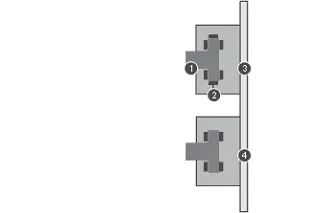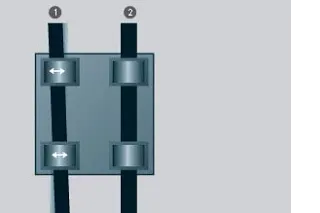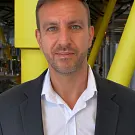Alterar idioma :
drylin® T - Regras de projeto
Dica de design

Versão com rolamento flutuante na direção z
A compensação de erros de paralelismo entre os trilhos montados é possível com um rolamento fixo/flutuante na faixa de até 0,5 mm. Durante a instalação, é importante garantir que o rolamento flutuante tenha aproximadamente a mesma folga em ambas as direções.
O projeto do sistema de rolamento fixo/não fixo recomendado por nós pode ser visto nas ilustrações ao lado.
As superfícies de conexão dos trilhos e vagões devem ter boa uniformidade (por exemplo, superfície fresada) para evitar tensão no sistema. Pequenas irregularidades nas superfícies de conexão podem ser compensadas individualmente até um determinado nível (0,5 mm), ajustando-se a folga para um valor maior. O ajuste da folga só é possível em um estado sem carga.
Se tiver alguma dúvida sobre o projeto e/ou a instalação, entre em contato com nossos consultores de aplicação.
1
trilho
2
Elementos deslizantes
3
Carro de rolamento fixo
4
Carro de rolamento flutuante LLZ ou LLY
Rolamentos flutuantes para sistemas de guia

Equalização automática de erros de paralelismo,
1º guia flutuante, 2º guia fixa
Ao usar sistemas com duas guias paralelas, um lado deve ser projetado como uma bucha flutuante. Há uma solução adequada de bucha fixa/não fixa para cada posição de instalação, seja ela horizontal, vertical ou lateral. Esse método de instalação evita a rigidez ou o travamento da guia no caso de desvios de paralelismo entre as guias. a bucha flutuante é realizada pela extensão controlada da folga na direção do erro de paralelismo previsto. Isso cria um grau de liberdade adicional em um lado.
Durante a instalação, é importante garantir que a bucha flutuante tenha aproximadamente a mesma quantidade de folga em ambas as direções. O projeto do sistema de bucha fixa/não fixa recomendada por nós pode ser encontrado nas ilustrações dos capítulos individuais dos sistemas. As superfícies de conexão para a guia e os carrinhos devem ter boa uniformidade (por exemplo, superfície fresada) para evitar tensão no sistema. Pequenas irregularidades nas superfícies de conexão podem ser compensadas até certo ponto por buchas flutuantes.
Forças excêntricas

A regra 2:1,
1º rolamento flutuante, 2º rolamento fixo
Algumas recomendações devem ser observadas para o uso bem-sucedido das buchas lineares drylin® livres de manutenção: Se a distância entre a força de acionamento e a bucha fixa for maior que o dobro da distância da bucha (regra 2:1), um coeficiente de atrito estático de 0,25 teoricamente leva ao emperramento da guia.
O princípio não depende da carga ou da força de acionamento. Ele é um produto do atrito e está sempre relacionado à bucha de fixação. Quanto mais distante o acionamento estiver da bucha da guia, maior será o desgaste e a força de acionamento necessária.
Se a regra 2:1 não for observada ao usar buchas lineares, o resultado será um movimento desigual ou até mesmo o bloqueio do sistema. Isso geralmente pode ser resolvido com modificações relativamente simples.
Se tiver alguma dúvida sobre o projeto e/ou a instalação, entre em contato com nossos consultores de aplicação.
Seu contato técnico
Será um prazer responder suas perguntas pessoalmente!

Horário de funcionamento:
De segunda a sexta-feira, das 8:00 às 17:00 horas.
Online:
24h